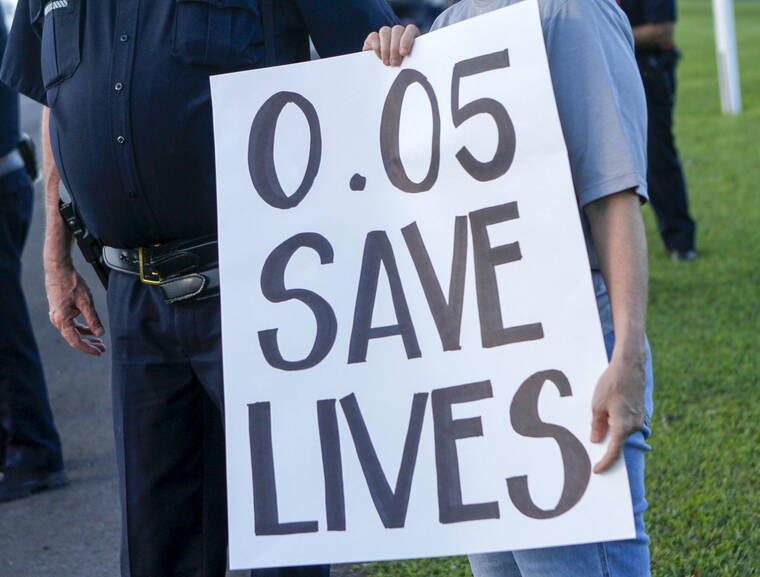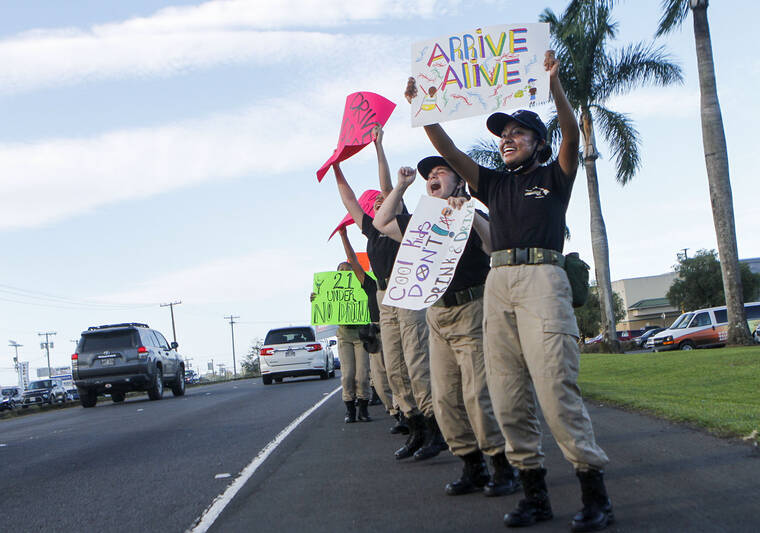A parade of testifiers Tuesday urged the state House Transportation Committee to lower the legal intoxication threshold for motorists from 0.08% blood alcohol content to 0.05%.
Committee Vice Chairman Rep. Darius Kila, a leeward Oahu Democrat, told Rep. Chris Todd, a Hilo Democrat and the committee chairman, there were 74 testifiers in favor of the measure and one in opposition to House Bill 1935, which Todd introduced.
There also were 124 pages of written testimony submitted about the bill.
Thomas Chapman of the National Transportation Safety Board testified on video, noting that Utah in 2018 became the first state to reduce the legal intoxication threshold from 0.08% to 0.05% — “and subsequently saw reduction in its fatal crash and fatality rates, relative to the rest of the United States.”
Chapman said the NTSB has recommended the BAC reduction since 2013.
“Passage of 0.05% legislation in Hawaii would make it the second state to embrace a change that will save lives and cut the number of senseless and completely avoidable crashes,” he said.
Hawaii County Prosecutor Kelden Waltjen, appearing on video, noted there was nearly a 20% decrease in traffic fatalities in Utah during the first two years after the BAC threshold was lowered.
“This bill isn’t about increasing penal sanctions,” he said. “What this bill is about is saving lives.”
Waltjen said impaired driving is an ongoing concern on the Big Island “given the rural nature of our communities, the design and limitations of our roadways — including use of two-lane, undivided highways, narrow shoulders lacking sidewalks, minimal guardrails, inadequate overhead lighting, and limited mass transit and ride-share options.”
Arkie Koehl of MADD Hawaii told lawmakers in person the U.S. is lagging behind most of the developed world in adopting the 0.05% BAC standard.
“As of 2023, there were 129 countries around the world using 0.05%,” he said. “These countries include the entire European Union, Japan, Russia, China, India, Australia, Canada and Brazil.
“The countries still using the old 0.08% BAC include Tanzania, Zimbabwe, Bolivia, Congo, Armenia, Zambia, the Bahamas — and the entire USA, except Utah.”
Camlyn Pola, vice chair of the East Hawaii Drug Free Coalition, testified in person that she survived a “horrific” crash on Highway 19 north of Hilo on Feb. 24, 1996.
“A car occupied by five teenagers crashed on the way back to Hilo after a party at Kolekole Beach Park,” she said. “The two drivers that caused the accident were impaired by alcohol. Three of the people in that car died, along with the innocent motorist who tried to avoid the collision.”
Pola said she still suffers from post-traumatic stress disorder.
“I know that 0.05% will save lives, and the community supports this bill. We deserve to see the lawmakers that we elected to choose this law,” she said. “How many more people need to die?”
Charlene Brown of Maui held a photo of her daughter, Hannah, a 19-year-old killed in 2019 by a drunken driver.
“We don’t want our children growing up thinking it’s OK to drink and drive,” Brown said via video. “We support the 0.05% law. … You guys are elected into office to help us. So, please help us. Think about it. This may even save a family member in your family.”
Ed Werner, whose 19-year-old son, Kaulana, was killed in 2016 by a drunken driver across Farrington Highway from the family’s Nanakuli, Oahu, home, said his son “died in my arms.”
“From 2019 to 2022, there were at least 10 fatal crashes (statewide),” he said, referring a statistic from the state Department of Transportation about crashes in which drivers had between 0.05% and 0.79% BAC. “The reason why I am calling them crashes — it’s not an accident. When people say it’s an accident, it’s 100% preventable, right? They made the choice to go out there and drive intoxicated.
“Now, can they take the responsibility, whatever comes their way? Most likely not. I didn’t get one apology for my son getting killed.”
Hawaii Police Department Chief Benjamin Moszkowicz supported the measure in written testimony.
“In Hawaii County, since 2016, 177 individuals have been killed in traffic crashes, and alcohol impairment was a factor in many of them,” Moszkowicz testified.
Moszkowicz said HPD has conducted many “wet labs” in the past several years.
“Certain impaired behaviors, such as greater risk-taking, was evident as the participants’ BAC drew closer to 0.08%,” he said. “During these events, participants with a BAC just under 0.05% indicated they would not drive due to consuming alcohol; however, as their BAC levels increased between 0.05% and 0.08%, they later indicated they would in fact operate a vehicle.
“This is a significant sign of impairment and a contributing factor in many crashes.”
After the testimony, Todd deferred a vote on the measure until the committee’s next meeting at 9 a.m. Thursday.
“Full disclosure, I do have a lot of concerns, I have a lot of questions,” Todd said. “I think some of the data out of Utah is, to me, very concerning, seeing that we have seen substantial increases since the initial year of implementation.”
Todd said the deferral about decision making was to “give the committee some time to confer with stakeholders.” He said he wanted to confer “especially” with Waltjen, “who I trust a lot.”
Todd added he wants to find a way forward, “but with a bill that I believe would be passable.”
“I do sense a lack of support (among lawmakers) for this measure as it currently stands,” he said. “But I’m hoping to work out some of that in the next couple of days and find something that we can move forward.”
Email John Burnett at jburnett@hawaiitribune-herald.com.













